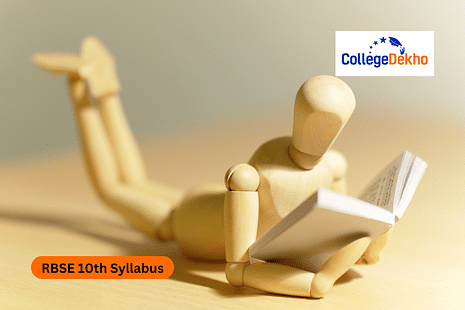RBSE 10th Syllabus 2024-25 has been released by the Rajasthan Board on its official website at rajeduboard.rajasthan.gov.in. In the article below, all the information related to the RBSE syllabus has been provided.


Never Miss an Exam Update
About RBSE 10th Syllabus 2024-25
The RBSE 10th Syllabus for 2024-25 has been released by the Rajasthan Board and is now available on their official website. If you're preparing for the board exams, make sure to check out the updated syllabus for Class 10. You can easily download it from the RBSE website: rajeduboard.rajasthan.gov.in. The syllabus covers all the subjects, including Hindi, English, Mathematics, Science, and Social Science. It’s important to go through the latest RBSE 10th Exam Pattern 2024-25 as well. The syllabus includes chapter-wise topics, units, and the marks distribution for each chapter.
Before diving into your exam preperation for 2025, be sure to review the RBSE 10th 2024-25 syllabus carefully. All RBSE-affiliated schools follow this syllabus, so understanding it will help you get a clear picture of what to expect in the exam. To find more details on the syllabus for all the important subjects, don’t forget to check out the full article.
RBSE 10th Syllabus 2024-25: Download PDF
The RBSE board has just released the curriculum for Class 10, and the great news is that it’s the same as last year’s! You can check out the updated syllabus on the official website. If there are any changes, the board will keep you in the loop, so no worries there! Since the exam question paper will be based on this syllabus, it’s super important for you to study every chapter and topic included. You can easily access the RBSE 10th 2024–25 syllabus in PDF format below.
RBSE 10th Syllabus 2024-25: Subject-Wise
Students, make sure to use the RBSE Class 10 Syllabus 2024–25 as a helpful guide to organize your studies and prepare for the upcoming board exams! This syllabus is a great tool to keep you on track. Remember, the RBSE Class 10 exam includes a mix of multiple-choice questions (MCQs), short answer questions, and long answer types, all covering every chapter and topic in the syllabus. So, dive in and get ready to shine in your exams! Students can also refer to RBSE class 10 previous years' question papers to review the topic allocation from the syllabus. A detailed RBSE 10th 2024-25 syllabus is provided below.
RBSE 10th English Syllabus 2024-25
Students can refer to the detailed information about the RBSE Class 10 English Syllabus 2024-25 from the pointers given below and use it to efficiently prepare for the exam:
Reading (15 Marks)
- Two unseen passages of a total of 350 words with a variety of questions including 4 marks for vocabulary.
- Only prose passages will be used. One will be factual and the other will be discursive.
- Passage 1—100 words (6 Marks), six comprehension questions(2 Multiple Choice Questions, 2 Comprehension questions testing local and global understanding, 2 questions on vocabulary—one testing the knowledge of similar words and the other testing the knowledge of opposite word)
- Passage 2—250 words (9 Marks), Nine Comprehension questions (3 Multiple Choice Questions, 4 Comprehension questions testing local and global understanding, 2 questions on vocabulary—one testing the knowledge of a similar word and the other of an opposite word)
Writing (13 Marks)
- Letter Writing — One out of two (Word Limit 80)
- (a) Personal — To friends, relatives, and members of the family.
- (b) Official — To Govt. officials, The Editor of a newspaper or a magazine, the Headmaster/Principal
- (c) Email — To family, friends, relatives, Govt. officials, the editor, teachers, headmaster, principal, and so on.
- (ii) To write a short story on a given outline.
- (iii) A short writing task based on a verbal or a visual stimulus (picture chart, table, etc.) with internal choice in about 60 words.
Grammar (15)
1. Tense 042. Reported Speech 02
3. Conjunctions 03
4. Relative Pronouns 02
5. Active and Passive Voice 02
6. Framing Questions and Question Tags 02
First Flight—Prose (19)
- Two extracts from different prose lessons are included in the textbook. Approximately 100 words each with the following type of questions— Six questions in each passage: 2 Multiple Choice Questions, 2 Comprehension questions testing local and global understanding, 2 questions on vocabulary—one testing the knowledge of a similar word and the other of the opposite word. 6×2=12
- (b) One out of two questions extrapolative in nature based on any one of the prose lessons from the textbook to be answered in about 80 words. 05
- (c) One out of two questions on Drama Text (local and global comprehension questions) in about 20 words.
- (a) One out of two extracts based on poetry from the text is used to test comprehension and appreciation. 2×2=4
- (b) Two out of three short answer-type questions on interpretations of themes and ideas contained in the poems are to be answered in about 20 words each. 04
- (a) One out of two questions from Supplementary Reader to interpret, evaluate, and analyze character, plot, or situations occurring in the lessons to be answered in about 60 words. 04
- (b) Two out of three short answer type questions on interpretation and evaluating nature based on lessons to be answered in 20 words each. 04
- (c) Two Multiple Choice Type Questions used on factual aspects of the lessons.
RBSE 10th Mathematics Syllabus 2024-25
Mathematics includes a lot of important units and chapters. The theory paper in Mathematics will be conducted for 80 marks. Students can check the detailed RBSE Class 10 Math Syllabus 2024-25 from the table given below:
Unit | Unit and Chapter Names | Topics |
|---|---|---|
1 | NUMBER SYSTEMS 1. Real Numbers | The Fundamental Theorem of Arithmetic, Revisiting Irrational Numbers. |
2 | ALGEBRA 2. Polynomials 3. Pair of Linear Equations in Two Variables 4. Quadratic Equations 5. Arithmetic Progressions | Geometrical Meaning of the Zeroes of a Polynomial, Relationship between Zeroes and Coefficients of a Polynomial. Algebraic Methods of Solving a Pair of Linear Equations (i) Substitution Method (ii) Elimination Method. Quadratic Equations, Solution of a Quadratic Equation by Factorisation, Nature of Roots. |
3 | GEOMETRY 6. Triangles 7. Circles | Similar Figures, Similarity of Triangles, Criteria for Similarity of Triangles. |
4 | COORDINATE GEOMETRY 8. Coordinate Geometry | Distance Formula, Section Formula. |
5 | TRIGONOMETRY 9. Introduction to Trigonometry 10. Some Applications of Trigonometry | Trigonometric Ratios, Trigonometric Ratios of Some Specific Angles, Trigonometric Identities. Heights and Distances. |
6 | MENSURATION 11. Areas Related to Circles 12. Surface Areas and Volumes | Areas of Sector and Segment of a Circle, Surface Area of a Combination of Solids, Volume of a Combination of Solids. |
7 | STATISTICS & PROBABILITY 13. Statistics 14. Probability | Mean of Grouped Data, Mode of Grouped Data Median of Grouped Data. |
RBSE 10th Social Science Syllabus 2024-25
Students can check the information about the RBSE Class 10 Social Science Syllabus 2024-25 from the table given below:
Unit | Chapters |
|---|---|
Unit - 1: The Rise of Nationalism in Europe | (i) The French Revolution and the Idea of the Nation (ii) The Making of Nationalism in Europe (iii) The Age of Revolutions: 1830-1848 (iv) The Making of Germany and Italy (v) Visualizing the Nation (vi) Nationalism and Imperialism |
Unit - 2: Nationalism in India | (i) The First World War, Khilafat and Non-Cooperation (ii) Differing Strands within the Movement (iii) Towards Civil Disobedience (iv) The Sense of Collective Belonging |
Unit - 3: The Making of a Global World | (i) The Pre-modern world (ii) The Nineteenth Century (1815-1914) (iii) The Inter war Economy (iv) Rebuilding a World Economy: The Post-War Era |
Unit - 4: The Age of Industrialization | (i) Before the Industrial Revolution (ii) Hand Labour and Steam Power (iii) Industrialization in the colonies (iv) Factories Come Up (v) The Peculiarities of Industrial Growth (vi) Market for Goods |
Unit - 5: Print Culture and the Modern World | (i) The First Printed Books (ii) Print Comes to Europe (iii) The Print Revolution and its Impact (iv) The Reading Mania (v) The Nineteenth Century (vi) India and the World of Print (vii) Religious Reform and Public Debates (viii) New Forms of Publication (ix) Print and Censorship |
Unit - 6: Resources and Development | (i) Types of Resources (ii) Development of Resources (iii) Resources Planning in India (iv) Land Resources (v) Land Utilisation (vi) Land use pattern in India (vii) Land degradation and conservation measures (viii) Soil as a resource (ix) Classification of Soils (x) Soil Erosion and Soil Conservation |
Unit - 7: Forest and Wildlife Resources | (i) Flora and Fauna in India (ii) Conservation of Forest and Wildlife in India (iii) Types and Distribution of Forest and Wildlife Resources (iv) Community and Conservation |
Unit - 8: Water Resources | (i) Water Scarcity and the Need of Water Conservation and Management (ii) Multipurpose River Project and Integrated Water Resources Management (iii) Rain Water Harvesting |
Unit - 9: Agriculture | (i) Types of Farming (ii) Cropping Pattern (iii) Major Crops (iv) Technological and Institutional Reforms |
Unit - 10: Minerals and Energy Resources | (i) Meaning of Minerals (ii) Mode of Occurrence of Minerals (iii) Ferrous and Non-ferrous Minerals (iv) Non-Metallic Minerals (v) Rock Minerals (vi) Energy Resources - Conventional and Non-conventional Sources (vii) Conservation of Energy Resources |
Unit - 11: Manufacturing Industries | (i) Importance of Manufacturing (ii) Classification of Industries (iii) Industrial Pollution and Environmental Degradation (iv) Control of Environmental Degradation |
Unit - 12: Lifeline of National Economy | (i) Transport: Roadways, Railways, Pipelines, Waterways and Major Sea Ports, Airways (ii) Communication (iii) International Trade (iv) Tourism as a Trade |
Unit - 13: Power Sharing | (i) Belgium and Sri Lanka (ii) Majoritarianism in Sri Lanka (iii) Accommodation in Belgium (iv) Why Power Sharing is Desirable (v) Forms of Power-sharing |
Unit - 14: Federalism | (i) What is Federalism? (ii) Federal System in India (iii) How Federalism is Practiced (iv) Linguistic States (v) Language Policy (vi) Centre-State Relations (vii) Decentralization in India |
Unit - 15: Gender, Religion and Caste | (i) Gender, Religion, and Caste (ii) Gender and Politics (iii) Woman Political Representation (iv) Religion, Communalism and Politics (v) Caste and Politics |
Unit - 16: Political Parties | (i) Why do we need political parties? (ii) How many parties should we have? (iii) Popular Participation in Political Parties (iv) National Parties (v) How can Parties be Reformed? |
Unit - 17: Outcomes of Democracy | (i) How do we assess democracy’s outcomes? (ii) Accountable, Responsive, and Legitimate Government (iii) Economic Growth and Development (iv) Economic Outcomes of Democracy (v) Reduction of Inequality and Poverty (vi) Accommodation of Social Diversity (vii) Dignity and Freedom of Citizens |
Unit - 18: Development | (i) Development Promises - Different People, Different Goals (ii) Income and Other Goals (iii) National Development (iv) Comparison of Different Countries and States (v) Income and Other Criteria (vi) Public Facilities (vii) Sustainability of Development |
Unit - 19: Sectors of the Indian Economy | (i) Sectors of Economic Activities (ii) Comparing the Three Sectors - Primary, Secondary, and Tertiary in India (iii) Divisions of Sectors as Organized and Unorganized (iv) Sectors in Terms of Ownership: Public and Private Sector |
Unit - 20: Money and Credit | (i) Money as a Medium of Exchange (ii) Modern Forms of Money (iii) Loan Activities of Banks (iv) Two Different Credit Situations (v) Terms of Credit (vi) Formal Sector Credit in India (vii) Self-help Groups of the Poor |
Unit - 21: Globalization and the Indian Economy | (i) Production Across Countries (ii) Interlinking Production Across Countries (iii) Foreign Trade and Integration of Markets (iv) Globalization (v) Factors that have Enabled Globalization (vi) World Trade Organization (vii) Impact of Globalization in India (viii) The Struggle for Fair Globalization |
Unit - 22: Consumer Rights | (i) The Consumer in the Marketplace (ii) Consumer Movement (iii) Consumer Rights (iv) Learning to Become Well-Informed Consumers (v) Taking the Consumer Movement Forward |
RBSE 10th Science Syllabus 2024-25
Science is also one of the most important subjects for the class 10 students. Check out the detailed information about the RBSE Class 10 Science Syllabus 2024-25 from the table given below:
Unit | Chapters |
|---|---|
Unit I: CHEMICAL SUBSTANCES - NATURE AND BEHAVIOUR | (1) CHEMICAL REACTIONS AND EQUATIONS: Chemical reactions: Types of chemical reactions, Effects of oxidation reactions in everyday life. (2) ACIDS, BASES AND SALTS: Chemical properties of acids and bases, Similarities in acids and bases, Strength of an acid or base solution, Information about salts. (3) METALS AND NON-METALS: Physical and chemical properties of metals and non-metals, Reaction of metals and non-metals, Extraction of metals, Corrosion, Prevention of corrosion. (4) CARBON AND ITS COMPOUNDS: Bonding in carbon compounds, Versatile nature of carbon, Chemical properties of carbon compounds, Some important organic compounds- ethanol and ethanoic acid, soaps and detergents. |
Unit II: WORLD OF LIVING | (5) LIFE PROCESSES: Life processes, Nutrition, Respiration, Transportation, Excretion. (6) CONTROL AND COORDINATION: Nervous system in animals, Coordination in plants, Hormones in animals. (7) REPRODUCTION IN ORGANISMS: Creating exact copies of themselves by Organisms, Modes of reproduction used by single Organisms, Sexual reproduction, Reproductive health. (8) HEREDITY AND EVOLUTION: Accumulation of variation during reproduction, Heredity. |
Unit III: NATURAL PHENOMENA | (9) REFLECTION AND REFRACTION OF LIGHT: Reflection of light, Spherical mirrors, Refraction of light. (10) THE HUMAN EYE AND THE COLOURFUL WORLD: The Human Eye, Defects of vision and their correction, Refraction of light through a prism, Dispersion of white light by a glass prism, Atmospheric refraction, Scattering of light. |
Unit IV: EFFECTS OF CURRENT | (11) ELECTRICITY: Electric current and circuit. Electric potential and potential difference, Circuit diagram, Ohm’s law, factors on which the resistance of a conductor depends, Resistance of a System of Resistors, Heating effect of electric current, Electric power. (12) MAGNETIC EFFECTS OF CURRENT: Magnetic field and field lines, Magnetic field due to current carrying conductor, Magnetic Field due to a current through a straight conductor, Right hand thumb rule, Force on current carrying conductor in a Magnetic field, Magnetic field due to a current through a circular loop, Magnetic field due to a current in a solenoid, Domestic electric circuits. |
Unit V: NATURAL RESOURCES | (13) OUR ENVIRONMENT: Eco-system and its components, Activities affecting the environment. |
RBSE 10th Information Technology Syllabus
Important units like Advanced Processing Tools, Cyber Crime & E-commerce, etc. are included in the RBSE class 10 syllabus 2024–25 for information technology. The information technology syllabus for RBSE 10th 2024–2025 is provided in the table below:| Units | Topics | Theory Marks | Practical Marks |
| Advance Processing tools | Introduction to MS Excel | 10 | 0 |
| Comparison between MS Word and MS Excel | |||
| Worksheets and Workbooks: Creating a Workbook | |||
| Opening, Labeling, and Formatting Workbook Tabs | |||
| Insert and Delete Cells, Rows, and Columns | |||
| Merging, Splitting, Hiding/Unhiding Columns and Rows | |||
| Reposition Sheets | |||
| Naming, Adding, Deleting, Hiding, Unhiding, Saving Workbooks and Worksheets | |||
| Navigating MS Excel | |||
| Format, Filter, and Sorting of Cells | |||
| Headers and Footers | |||
| Set Margins For Headers and Footers | |||
| Information About Printing: Select Print Area, Print a Range of Pages | |||
| About Entering Information into Excel: Entering Data, and others | |||
| Cybercrime and E-commerce | Cyber Law | 25 | 15 |
| Technical Aspects of Cyber Crime | |||
| Computer Viruses | |||
| Social Engineering | |||
| Phishing | |||
| Software Piracy | |||
| Intellectual Property | |||
| Mail Bombs | |||
| E-Commerce: Features, Advantages to Organizations, Customers, and Society | |||
| Technical and NonTechnical Disadvantages | |||
| E-Commerce Business Models | |||
| The six components of a marketing plan for small business | |||
| Perform SWOT Analysis | |||
| Business Philosophy and Vision | |||
| E-Business Security | |||
| Application and its system software | Definition of Computer Data | 25 | 15 |
| Information | |||
| Computer Instruction | |||
| Computer Program | |||
| Software: Application and System Software | |||
| Uses and Examples of Application Software and System Software | |||
| Proprietary Software and Open Source Software (OSS) | |||
| Foundation of the Open Source Software | |||
| Comparison Between OSS and Proprietary Software | |||
| Internet and its application | Objectives of Computer Network Application of Networks, Local Area, others | 10 | 0 |
| Components of Computer Network | |||
| Advantages and Disadvantages of Computer Network | |||
| Application of Networks: Local Area, and others |
How to Download RBSE 10th Syllabus 2024-25?
Every year, the RBSE board publishes the curriculum and syllabus for class 10 on the official website. Students can follow these steps to download the RBSE class 10th 2024-25 syllabus from the official website below:
- Step 1: Go to the Rajasthan Board's official website.
- Step 2: Select the link labeled "Anudeshika Pathyakram 2024-2025."
- Step 3: Select "Kaksha 10 Hetu" from the menu.
- Step 4: The RBSE 10th syllabus will be displayed on the screen.
- Step 5: Download and save the class 10 syllabus RBSE 2024-25 PDF for future reference.
Benefits of Knowing the RBSE 10th Syllabus 2024-25
There are a lot of benefits available for the students if they download the latest RBSE 10th Syllabus 2024-25 and use it to prepare for the exam such as:
- Students, your syllabus is a super handy tool! You can use it to check the marking scheme for the exam and quickly spot the topics that are most important. This helps you focus on what really matters. Plus, it’s perfect for tracking your study sessions, so you know exactly what you’ve covered. Just make sure to refer to the latest syllabus from the Rajasthan Board of Secondary Education!
- The syllabus also helps you identify all the chapters included in your curriculum. Having a solid understanding of these topics is essential for preparing well for your exams. Keeping an eye on your syllabus will show you if you’re on the right track to achieve those great marks you’re aiming for!
- And don’t forget, the syllabus PDF is just as valuable for your teachers. It helps them understand the curriculum and plan their lectures to ensure everything is covered on time. So, let’s make the most of it and ace those exams together!
RBSE 10th Syllabus 2024-25: Preparation Tips
Some of the key preparation tips for the Rajasthan Board class 10 exams are as follows:
- Students are advised to focus more on Prose- First flight in the RBSE Class 10 English syllabus as this part will carry more marks in the exam. Also, students must practice unseen comprehension and composition daily to develop their writing skills.
- In Hindi, Textbook: Kshitij will have the highest marks weightage. Students should practice the grammar section regularly as this will carry considerable marks.
- The highest weightage carrying units in the Math are Geometry, Algebra, Statistics and Probability, and Mensuration. Maintain a separate notebook to note down all the important formulae.
- In the RBSE Class 10 Science syllabus, Human Body and Processes, Matter and Processes, and Physics Phenomena will have the maximum weightage in the exam. Science is a conceptual-based subject, hence make sure to keep your basics very clear about all the concepts.
- The History and Civics will carry the maximum weightage in the RBSE Class 10 Social Science. Memorize all the important dates and events by writing them in your notebook. Add diagrams wherever necessary.
FAQs
Students can buy NCERT or the books prescribed by their teachers to check the RBSE 10th Syllabus 2024-25 since these are published based on the latest curriculum.
Rajasthan Board of Secondary Education has released the RBSE 10th Syllabus 2024-25 on the official website to be downloaded by the students. No major changes are reflected in the syllabus however still the students need to download the latest curriculum to prepare for the exam.
Students need to first visit the official website of the Rajasthan Board of Secondary Education at rajeduboard.rajasthan.gov.in/ and now click on the option called अनुदेशिका 2020 एवं पाठयक्रम 2023-2024 एवं 2024-2025 from the left-hand side of the homepage to download the RBSE 10th Syllabus 2024-25.
Rajasthan Board of Secondary Education provides the PDF of the RBSE 10th Syllabus 2024-25 in both English and Hindi to be downloaded by the students from the official website.
Old books and curriculum can be used to prepare the RBSE 10th Syllabus 2024-25. No major changes are reflected in the curriculum so the old books can be used by the students without any problem however do check the latest curriculum just to make sure.
Was this article helpful?

















